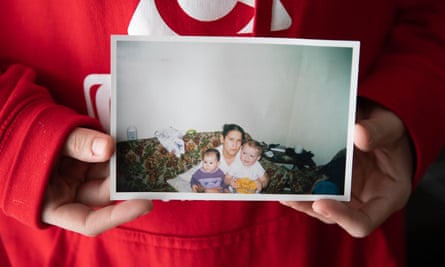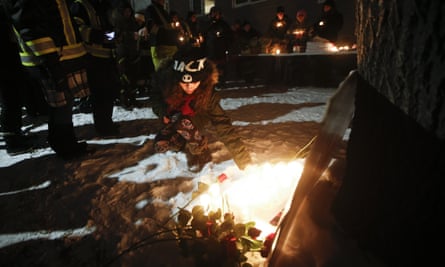[ad_1]
When police in the Canadian city of Winnipeg announced in May that they had discovered the partial remains of Rebecca Contois, a young Indigenous woman, at a local landfill, Cambria Harris grew worried.
Her own mother, Morgan, had been living on the streets for years but not long before she had inexplicably disappeared.
Cambria and her family canvassed downtown Winnipeg with Indigenous activists of the Bear Clan patrol, visiting anywhere that could provide clues: soup kitchens, shelters and hotels. They scanned hours of security footage at local pawn shops in an attempt to locate Morgan, a woman short in stature but armed with an infectious personality.
“Everyone knew my mom, and they all had something good to say about her,” said Cambria. “But no one had seen her.”
In December, they learned from police that Morgan, 39, whose battles with addiction and homelessness were offset by a fierce sense of humour, was one of the ten Indigenous women killed in Winnipeg this year – and is likely one of four women targeted by a serial killer who police suspect dumped his victims in landfills.
The news was devastating, but not completely unexpected. Cambria, who spent much of her early years shuttled between Winnipeg’s shelter and foster systems, had for years seen local Indigenous families broken by grief as their loved ones were torn from them.
When the body of a young Indigenous girl named Tina Fontaine was recovered from a river that bisects the city in 2014, Harris was one of thousands who protested against the violence against Indigenous women, carrying a sign that said “I Will Not Be Next”.
“I’ve watched my Indigenous sisters live in fear. They can’t leave their house. And they can’t take cabs because they don’t feel safe … Because they have missing loved ones,” said Harris. “I’ve watched my community come together in the most beautiful ways, but it’s always been for the wrong reason: when someone murders our women.”
Now, after the death of her own mother, Harris refuses to be cowed. Any grief she has allowed herself has been transformed into unwavering anger and determination as she has challenged police and government with a simple message: bring my mother’s body home.

In recent decades, at least 4,000 Indigenous women and girls have been murdered – or simply vanished, a reality described in a landmark 2019 report as a “genocide”. And against a backdrop of systemic inequity and injustice, vulnerable Indigenous women continue to be victims of neglectful policies and state indifference.
Since murder charges were announced against suspected serial killer Jeremy Skibicki on 1 December, police in Winnipeg have highlighted the challenging nature of the investigation, which spans two landfills around the city: the Brady landfill, where the remains of Rebecca Contois were found and the Prairie Green landfill, where investigators believe Harris and Marcedes Myran, 26, are buried. But police who are also still trying to identify one of the victims, do not have the resources to search the refuse at the Prairie Green facility, much of which is buried under tonnes of clay.
For victims’ families, the speed with which local authorities appeared to rule out a thorough search of the site has only added to the pain.
“They keep saying it comes down to feasibility. But it doesn’t come down to feasibility when it’s about human beings and bringing these people home,” said Harris. “Enough is enough. You’re going to look. You’re at least going to try. And if you can’t find them, then we’re at least going to put something there to commemorate them.”
After news broke of her mother’s killing, Harris and sisters travelled to Ottawa to meet with Indigenous leaders and lawmakers on parliament hill, demanding more be done to locate the victims.
They were given a private meeting with prime minister Justin Trudeau, who hugged them and promised his government would do “everything we can” to help.
But Harris insisted that words alone are not enough.
“These women need to be found, and they need to come home,” she told him.
When the sisters returned to Winnipeg, they redoubled their efforts. They called on the police chief to resign. They demanded a search of the landfill – no matter the cost.
“I’ve had to grieve in front of the world. And that’s traumatizing. I shouldn’t have to do that,” she said. “I shouldn’t have to beg for help.”
Driven largely by the family’s public anger, both the province and federal governments, as well as the police, have pledged to carry out a feasibility study for a search of the two landfills.
Despite bitter winter weather, a group known as the First Nations Indigenous Warriors has set up a protest camp outside the Brady landfill, temporarily shutting down the facility to keep up pressure on local officials. Community members have donated food, water, wood and propane as nighttime temperatures approach -25F.
“Our sisters’ lives matter. Our sisters are not trash. We will fight for them,” Taylor Orpin, one of the protestors, said during a livestream. “We will not go anywhere until our sisters are brought home.”

Harris admits the fight – against slow-moving institutions and a society that she feels has long ignored the crisis – has left her exhausted.
“I can’t sleep because I think of my mother – and who knows who else – resting underneath piles of trash. And that’s not right. All missing people have to be somewhere.”
Cambria’s determination to honor the memory of her mother has helped push her through both the fatigue and the torrent of hateful and racist messages she’s received as a result of her advocacy.
“Every morning I wake up and ask myself what I’m going to do to make my mom proud. What am I going to do to to help her?” she said. “What am I going so that she can finally pass on fully? So that she can finally come home?”
[ad_2]
Source link
